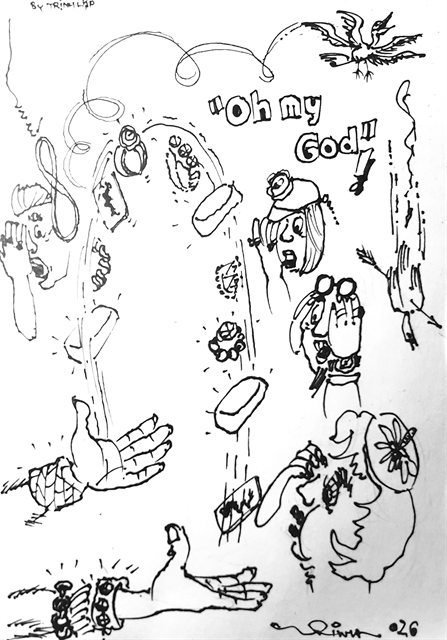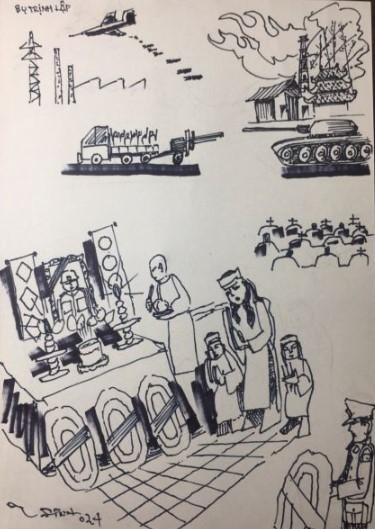 Talk Around Town
Talk Around Town

 |
| Illustration by Trịnh Lập |
by Nguyễn Mỹ Hà
On this day, May 12, 1954, President Hồ Chí Minh wrote a public letter to the army telling everyone who participated in the greatest campaign that had just ended in victory: "The government and I have decided to award you all with the badge Soldier of Điện Biên Phủ."
The badge is not just a memorabilia of a long battle of a barefooted army defeating a fully equipped, financially resourceful French armed forces, it is the spirit of a united nation backed by the people who never ceased to believe in the final and ultimate win. It's part of the generational spirit that still keeps inspiring the youth of today.
Seventy years have passed, but those who survived that war, and several more after that, today maintain that fire in their eyes despite ailing health or restricted mobility.
The Điện Biên Soldier Badge was an idea of General Võ Nguyên Giáp in the second phase of the campaign, to bear the spirit of this military campaign and to encourage and raise the morale of our soldiers.
A two-man team was given the task of creating the badge: artist Mai Văn Hiến, born in the southern province of Tiền Giang, a student at the Indochina School of Fine Arts, and self-taught painter Nguyễn Bích, a Hà Nội native.
The assignment was that the badge should include images of the mountains and forests, with the image of a soldier wearing the signature bamboo wicker hat with camouflage leaves inserted around the hat in an advancing position. It also had to include an image of the artillery and anti-aircraft guns used during the battle. The badge should also depict the "Determine to Fight, Determine to Win" flag of the Vietnam People's Army.
The artists worked together on this special assignment, which they solemnly took on with all their hearts and minds. Many ideas were brainstormed, and many sketches were done. Finally, 10 designs of the badge were completed in pencil and one final was approved, and Nguyễn Bích finalised it, with an iron pen dipped in ink. It was passed by the Campaign Headquarters and the Điện Biên Phủ Badge became what we see today.
The soldiers' spirit to overcome insurmountable challenges on the battlefront, put the army, and the name of the country on the world map. But behind the sacrifices were the lives of the wives, the parents, and children of the fallen soldiers who never returned home.
The younger generation today try their best to put themselves in the shoes of their forefathers by trying to push the rice cart in line during parades like their ancestors did, known as the dân công hỏa tuyến, literally translated as "fireline volunteer labourers".
But every victory badge has its reverse side. The lost lives of these soldiers were dedicated to the greater cause of the country, but their loved ones suffered a great loss that could never be compensated.
On May 7, 2024, a heavy downpour shed much-awaited rain on Điện Biên City, after a week-long drought and heat wave. All soldiers and people taking part in the victory parade had to work in the scorching heat of above 40 degrees Celsius.
During the rain, the military units stood intact, even the Điện Biên child, held up by a soldier stood firm and didn't show any sign of fear or worry. People say, the uneven battle even moved God to tears. The downpour symbolically became one of tears for those who fell and now rest forever in Điện Biên's lands.
The three cemeteries in Điện Biên Phủ these days received endless lines of people paying tribute to the war martyrs who perished in the final 56-day long battle. Among them were relatives and families of those who died.
On national television, an elderly woman in her 70s went searching for her father's grave. She made this trip, hoping to find traces of her father's remains. But she collapsed in front of a grave bearing the words "Martyr whose name not yet found".
She said she only remembers meeting her father when she was five years old when he came home on his leave, he patted her head and let her sit on his lap. It was the last time she saw him.
The woman, now in her late 70s and a proud mother and grandmother, said her and her sister's hearts stopped when thinking about the loss of her father when she was such a young girl.
She recalled that when she was still under 10, her mother remarried, and she got to live with her paternal grandmother. Many times when she cried missing her father, Grandma would hug her saying, "My dear, it is not only you that is missing your dad, I miss my son, too."
For each fallen soldier, you can multiply the sense of loss exponentially. The void they left in the hearts of their families is vast. Those wounds never heal.
Remembering Điện Biên Phủ, many eloquent speeches were made by the Vietnamese government and military leaders in recent days. But the sacrifices the families have borne forever stayed personal. As the engravings on a great number of unknown soldiers tombs in Điện Biên Phủ put it, "We haven't tracked down your name, but your feat is forever remembered." VNS




